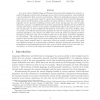Free Online Productivity Tools
i2Speak
i2Symbol
i2OCR
iTex2Img
iWeb2Print
iWeb2Shot
i2Type
iPdf2Split
iPdf2Merge
i2Bopomofo
i2Arabic
i2Style
i2Image
i2PDF
iLatex2Rtf
Sci2ools
110
click to vote
COCOON
2006
Springer
2006
Springer
Reconstructing Evolution of Natural Languages: Complexity and Parameterized Algorithms
In a recent article, Nakhleh, Ringe and Warnow introduced perfect phylogenetic networks--a model of language evolution where languages do not evolve via clean speciation--and formulated a set of problems for their accurate reconstruction. Their new methodology assumes networks, rather than trees, as the correct model to capture the evolutionary history of natural languages. They proved the NP-hardness of the problem of testing whether a network is a perfect phylogenetic one for characters exhibiting at least three states, leaving open the case of binary characters, and gave a straightforward brute-force parameterized algorithm for the problem of running time O(3k n), where k is the number of bidirectional edges in the network and n is its size. In this paper, we first establish the NP-hardness of the binary case of the problem. Then we provide a more efficient parameterized algorithm for this case running in time O(2k n2 ). The presented algorithm is very simple, and utilizes some str...
Brute-force Parameterized Algorithm | COCOON 2006 | Combinatorics | Efficient Parameterized Algorithm | Parameterized Algorithms |
Related Content
| Added | 20 Aug 2010 |
| Updated | 20 Aug 2010 |
| Type | Conference |
| Year | 2006 |
| Where | COCOON |
| Authors | Iyad A. Kanj, Luay Nakhleh, Ge Xia |
Comments (0)

